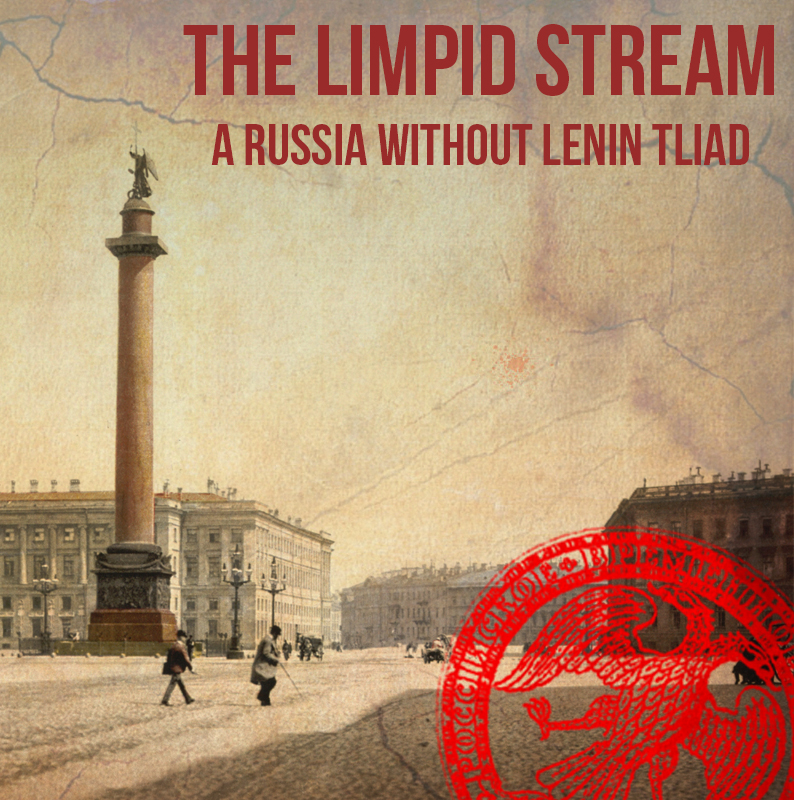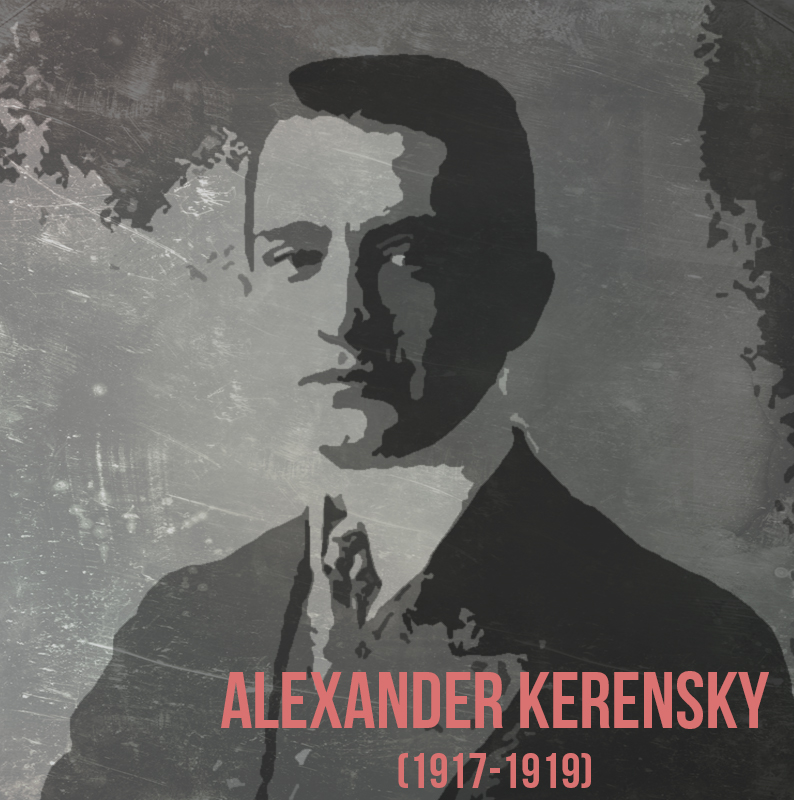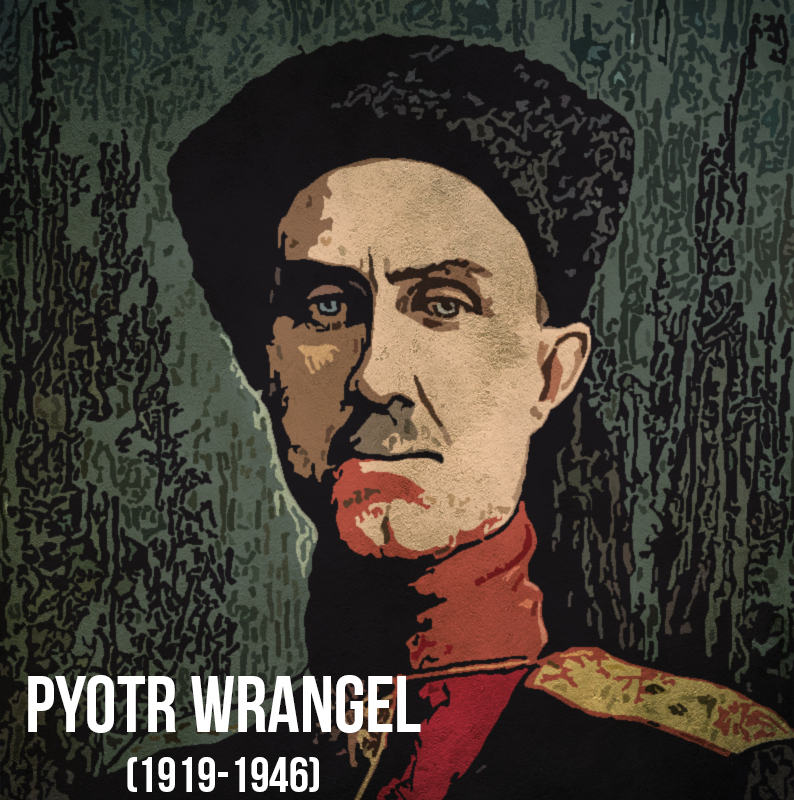1917-1919: Alexander Kerensky - (Social Revolutionary)
The man who destroyed one Empire, and created another.
What strangled Bolshevism? Certainly, the assassination of Vladimir Lenin at Finland Station on 15th April 1917 did not help the Communist cause. As he mounted the makeshift podium that had been hastily hammered together from the little available lumber left in Petrograd, he could have been forgiven for allowing himself a small smile. Lenin's personal papers, now available to any keen researcher at the University of Zurich, indicate that he had already planned out an uprising against the Provisional Government in Petrograd, which he felt would have been undone as the war against Germany continued.
How effective his plans would have been is a matter of speculation. A matter of seconds after mounting the steps to the ramshackle lectern, a single shot was fired. As the crowd dispersed, screaming, the herald of Russian Marxism lay dying in the watery spring air.
The reaction from the revolutionary intelligentsia was immediate. Some accused the anarchists for the action, others right-wing elements of the Provisional Government. A select few even whispered rumours that the assassination had been masterminded by Nikolai Bukharin, Lenin’s friend and rival, who assumed leadership of the shell-shocked Bolsheviks in the days following the incident. Despite this, the furious reaction of the revolutionary left-wing was a unifying factor for the anti-war movement, with the Petrograd and Moscow Soviets calling for general strikes on 13th April.
By this time, the true benefactor of the assassination had risen to prominence. Alexander Kerensky, the interim Minister of Justice, assumed the mantel of leadership following the sudden resignation of Prince Lvov. Orthodox history has traditionally viewed Kerensky’s actions as motivated by the lack of attention accorded him owing to the strike action, but more revisionists theses have proposed that the Social Revolutionary leader was driven by a desire to end the war with Germany by any means necessary - a decision that he considered to have been one that was best made whilst the left-wing opposition was still in disarray.
The Declaration of Lomonosov on May 1st, International Labour Day, ended Russian involvement in the Great War, nominally at least. Kerensky had already informed both Paris and London that such an announcement was only interim, intended for the country to recuperate and stave off civil war whilst military and economic reforms were completed. Flanked by the new Minister of Defence, Lavr Kornilov, Kerensky also announced that the Russian army would retreat for the duration of the summer. Whilst humiliating on paper, the vast Austro-German force that would be required to police the newly independent nations of eastern Europe would only increase the pressures on the Western Front. For Jozef Pilsudski, the interim-Prime Minister of the newly and nominally independent Kingdom of Poland, the peace was only an “interim one, merely an intake of breath by the Russian bear, steadying to blow down all before him!” Pilsudski’s words, now immortalised in his diary at the Royal Museum in Warsaw, today seem highly prophetic.
Co-currently, Kerensky also called for the formation of a new “Constitutional Assembly”, with elections being held over a ten day period in the summer of 1917. Despite complaints from some quarters about the rapidity of the decision, as well as the general ill-preparedness of the country to actually hold the elections, the polls went ahead as planned, resulting in a landslide victory for the SRs, who held a narrow majority over the Constitutional Democrats, a loose coalition of “Rightists” (monarchists, anti-Semites, Germanophobes or, in many cases, all three) and the rump Mensheviks. Despite demands from some on the right to recall the monarchy, the overwhelming majority of delegates voted in favour of a “Chairman-President”, or figurehead, to become head of state. Kerensky, fearing that he would be appointed to the position in an effort to curtail his power, immediately proposed Prince Lvov for the role. Despite some grumblings about the Premier’s “Dictatorial Leanings”, Lvov was appointed unopposed.
For the first time in years, Russia had a government that felt minded to focus on domestic matters. Despite the vast swathes of territory under the control of the Central Powers - the majority of industrial capital remained under the control of Petrograd, whilst various nationalist rebel armies harried their new occupiers. Nestor Makhno ravaged the Austro-Hungarians in Ukraine, Ramishvili’s Transcaucasian Army stormed into Anatolia, whilst the army of the Grand Duchy of Livonia remained unwilling to march on Petrograd.
Despite the harsh winter, Kerensky’s ceasefire, coupled with food aid from the United States, kept the cities from starvation, with the Social Revolutionary’s traditional base in the countryside sufficiently placated by the promise of land reform to remain loyal to the capital. On 23rd January, the remaining Bolsheviks in Moscow, led by Dybenko, attempted to take control of the Kremlin, but were unsuccessful. Dybenko’s Cossack background allowed Kerensky to frame the attack as “a vain effort by Ukrainian Nationalist Wreckers”, which only served to increase resentment towards Kiev. As spring approached and the Constitutional Assembly renewed itself in the second Duma, Kerensky made yet another gamble.
The re-entry of Russia into the Great War on 12th May 1918 came as a surprise to many members of the revolutionary clique in Petrograd, most of all Nikolai Bukharin, who suddenly found himself at the head of a large uprising by the members of the United Soviets. This aborted coup d’état by the Bolsheviks failed miserably, not least because of their failure to co-ordinate their actions against the Kerensky government. Holding up in the Peter and Paul fortress, it is not known if the Bolshevik leader was killed by gunfire, one of the many salvos fired from the battleship Potemkin, or from a self-inflicted bullet wound. By nightfall on the 14th, the remaining Bolshevik leadership had either fled the city, been captured or killed. Control of the greatly enfeebled Petrograd Soviet passed to the Mezhraiontsy leader, Leon Trotsky.
For Premier Kerensky, the defeat of the Bolshevik uprising secured his intention to force the war to a fairer settlement after the humiliation of the Declaration of Lomonosov. Under the able leadership of Baron Wrangel, the Republican Army soon shattered the Austro-Hungarian forces propping up the unstable National Republic of Ukraine. In the north, General Brusilov, learning much from his failed offensive of 1916, managed to drive the German troops stationed in the Baltic almost into the sea. These advances on the Eastern front coincided with a fresh Allied assault in the Somme. Despite heavy casualties, especially by the Anglo-Canadian forces, the German line was pushed back substantially for the first time in over three years.
With yet another turnip winter looming for the dispirited citizens of Berlin and with leaders in both Vienna and Constantinople seeing their empires on the verge of total dissolution, Kaiser Wilhelm, displaying a rare act of assertiveness, requested a ceasefire. The failure of the right to seize power forced moderate voices within the Reichstag to reach an armistice agreement. On New Year’s Eve, one was granted, with peace talks opening in Strasbourg in April.
The Treaty of Aix-la-Chapelle, signed close to the site of Charlemagne’s Palace, revoked most of the gains made by Germany following the Franco-Prussian War as well the terms of the voided peace with Russia. Polish independence was formally guaranteed, with Zdzislaw Lubomirski installed as King, although real power was placed in the hands of the Prime Minister, Józef Pilsudski. The Ottoman Empire collapsed into civil war soon after, Austria-Hungary only avoiding a similar fate by establishing a tripartite system with the proclamation of the Kingdom of Croatia.
Kerensky watched the victorious “Army of Prussia” return to Petrograd in triumph, taking the salute as they marched down Nevsky Prospekt. The British Ambassador, Sir George Buchanan, reported to his superiors in Whitehall that the momentum was such that Kerensky could have removed Chairman Lvov and merged his position into the Premiership. However, for various reasons, Kerensky chose not to do so. Perhaps, as he admitted years later, he feared that the post-war economic collapse would have made him even more synonymous with the increasingly unpopular government.
Russia was not saved from the post-war economic and social chaos. Although the threat of revolution had rescinded somewhat, the radical left remained a constant threat to Kerensky's government, which soon found itself governing a small and increasingly insignificant coalition of the centre. President Lowden's geo-political horizons, parochial for all that they were Hobbesian, failed to build upon Woodrow Wilson's offer of loans to the shattered Russian economy economy, which Kerensky soon found to be imploding around him. He was swiftly dispatched from power in July, and - following a brief period as Ambassador to Sweden - found himself on the first ship to Harwich with the start of the Autumn Purge of 1923.



